When they report and change your words to fit the story it is rather disconcerting. If they can’t report honestly on trivial matters how does one trust them on anything ?Outrageously true. I have been involved in MANY news stories - some important some trivial. But i have NEVER seen one reported without significant error. Most don't matter in the grand scheme, but reporters are NOT good at getting the facts 100 percent correct And i doubt most of that was 'intentional' it's just the way it is.
So always with a grain of salt until you hear it from every angle.
The Origin of the Wuhan Coronavirus
- Thread starter B00Mer
- Start date
You are using an out of date browser. It may not display this or other websites correctly.
You should upgrade or use an alternative browser.
You should upgrade or use an alternative browser.
one does not if one is wise. you can take it as an "unverified 'report of' - but don't trust anything as being gospel.When they report and change your words to fit the story it is rather disconcerting. If they can’t report honestly on trivial matters how does one trust them on anything ?
One always wants to remember Mr wilde's commnet - "If you don't read the paper you're uninformed. If you do read the paper you're misinformed,"
Intelectual laziness in the most part. Most reporters have some sort of Journalism major which doesn't teach them much on any subject. They approach as story knowing little. They listen until they think they understand and then they consider themselves experts and make a report. Unfortunately in most cases they have just scratched the surface and if they learned a bit more could do a better story. But they do the minimum and you get errors.Outrageously true. I have been involved in MANY news stories - some important some trivial. But i have NEVER seen one reported without significant error. Most don't matter in the grand scheme, but reporters are NOT good at getting the facts 100 percent correct And i doubt most of that was 'intentional' it's just the way it is.
So always with a grain of salt until you hear it from every angle.
True. It is somewhat similar to the effect one sees in the 'telephone game' where a phrase passed to the next person becomes distorted as their mind interprets it and fills in additional information or missing info.Intelectual laziness in the most part. Most reporters have some sort of Journalism major which doesn't teach them much on any subject. They approach as story knowing little. They listen until they think they understand and then they consider themselves experts and make a report. Unfortunately in most cases they have just scratched the surface and if they learned a bit more could do a better story. But they do the minimum and you get errors.
ANd of course many are on deadlines and are just rushing to get the story out as fast as possible. As long as it's MOSTLY accurate in their minds, good enough.
Here's some fun - go do a web search for "lisa laflamme fired". You will find dozens of news stories about how she was fired, using that specific word. But laflamme was never fired. Her contract ran out and they chose not to renew it with a new contract. They never fired her. One might say she was 'dropped', or the like, but she was never fired at all. And it's an important difference.
Roger that. The day of the competent science reporter seems to be behind us.Intelectual laziness in the most part. Most reporters have some sort of Journalism major which doesn't teach them much on any subject. They approach as story knowing little. They listen until they think they understand and then they consider themselves experts and make a report. Unfortunately in most cases they have just scratched the surface and if they learned a bit more could do a better story. But they do the minimum and you get errors.
The good news is we have plenty of asswits on Twitter doing their own research.
It's on the internet, it must be true!Roger that. The day of the competent science reporter seems to be behind us.
The good news is we have plenty of asswits on Twitter doing their own research.
I love the reporters that use Twitter as source information to their story. Laziness to a new level.
I stumbled across something this morning, just a news story, about around 1000 scientists, mostly retired so outside of hunting for funding, as signatories on a paper regarding AGW/Whatever….it’s interesting.Science ALWAYS cares. The only question is how much influence bias has in any given science.
When there is minimal bias or influence then science tends to be relatively accurate. When there is a lot, we get skewed results.
More than 1,000 signatories, including climate scientists and other experts, have endorsed a “World Climate Declaration,” asserting that there is no present climate emergency??? But how is that even possible? They MUST be ill informed!! No soup for you!! “What do you mean they’re retired? Don’t give them grants &…oh…”
…However we can look at climate change science as a more practical example. Projects that start with the hypothisis that climate change is man made tend to get funded. Projects that intend to examine other causes are not. Projects that attempt to look at the future damage if nothing changes are well funded, but projects that tend to look at how humans might adapt to such changes instead of reducing them are much less likely to.
Conrad Black: A measure of dissent — National Post
The federal government has not only missed the policy bus; it has embarked on a dysfunctional policy leading away from where we should be aspiring to go: achieving adequate knowledge to enact the best policy
The foundation Climate Intelligence (CLINTEL) produced a one-page statement arguing that climate science should be less political and more open about the many uncertainties in predictions of global temperature changes and more comprehensive in judging the costs and benefits of proposed policy measures, especially radical reductions in the use of fossil fuels. Sounds Unreasonable already in todays light of one sided reaction.
Crok acknowledged that advocates of proactive fossil fuel reduction had objected to CLINTEL’s findings and had particularly made a point of the fact that many of the 1,152 signatories are not now active climate scientists and that many are retired.And projects that prove the worst and most drastic results get the most love and that team tends to get more future funding. Have you noticed that it's ALWAYS the case that more recent research shows previous estimates were wrong and it's "Much Worse/badder than we ever thought! (yikes!)"
He said that both these claims ”are true and very understandable,” by which he meant that the status of many of the paper’s supporters is understandable, not the activists’ objections to them.
He explained that the majority of working climate scientists today rely on government money for their income and that climate activists are so zealous and aggressive, those who dissent from the conventional wisdom do so at risk of their jobs.
Crok made the point that activists dominate the media and academia and almost never engage in direct debate with those who consider the possibility that a less alarmist view than the conventional wisdom is not just a cranky denial of “settled science.”
The old “Do not question my statement or Authority ‘cuz Settled Science” line….
The activist leadership rely on their domination of the media to discredit the dissent as coming either from parties financially interested in traditional energy sources, or eccentric or even mad contrarians. Many commentators, however, have pointed out that these decades of mistaken dire predictions of imminent climate disaster are bound to incite skepticism. The climate disaster has supposedly been imminent for over 50 years..
So we will wind up with a body of 'science' that is incomplete and somewhat inaccurate and doesn't present all the options available. Science cares.
(I know this is a huge side track from the whole “Wuhan Lab or Market” question)
Former U.S. vice-president Al Gore, who has made himself a centimillionaire from his decades of doom-laden climate jeremiads, produced his film “An Inconvenient Truth” 20 years ago. It made a number of alarmist claims, including whole cities under water and frequent super-hurricanes, that never materialized.
It has been well over a decade since the Prince of Wales warned us that the end was nigh and that we would all be doomed within “less than 100 months” without drastic conservationist measures.
It has been more than 15 years since then-British prime minister Tony Blair, otherwise a sensible man, wrote to European leaders warning that, “We have a window of only 10-15 years to take the steps we need to avoid crossing catastrophic tipping points.”
Of course, the fact that all of this has proved to be nonsense, as many people at the time evidently believed it to be, does not mean that there is no truth to any of it
Not a single person in the world approves of the pollution of the air and water, and in many countries, great and gratifying progress has been made in cleaning up the environment.
But it is becoming increasingly obvious, especially in western Europe and more recently in the United States, that the sensible majority of citizens will not tolerate the unsustainable increases in the cost of normal life inflicted on all of our societies by a headlong rush into sustainable energy.
The eco-zealots have refused for 30 years to acknowledge that we absolutely do not have any precise predictions of where present climate trends may lead. It is hard to argue with CLINTEL’s statement that “the gap between the real world and the modelled world tells us that we are far from understanding climate change.… Climate models have many shortcomings and are not remotely plausible as global policy tools.”
The CLINTEL paper continues to attract learned supporters and it warns that, “Climate science has degenerated into a discussion based on beliefs, not on sound self-critical science.”
No country has been more profoundly afflicted by this planetary blunder than Canada, and no large country is less offensive to the environment or better placed to lead serious objective research to assure that humanity responds constructively to climate issues. It is needless to add that the current federal government has not only missed the policy bus; it has embarked on a dysfunctional policy leading away from where we should be aspiring to go: achieving adequate knowledge to enact the best policy.
An excellent example. Science ALWAYS cares about human bias and politics, and that's not surprising at all because it's a process that relies on humans from start to finish. Humans create the questions, humans craft the experiments, humans fund it and humans interpret the results. So it's almost impossible to separate the human element from the "science".
Yes, simply reading the headlines isn't news. Most times, the headlines are very deceiving and not even remotely close to what the story actually is.Whenever I see we’re someone or other is accused of some horrible foopaw I try and watch the whole interview , speech or whatever . It is amazing how close to reality the reporting isn’t.
Investigative journalism has gone by the way-side. They couldn't be bothered to actually dive into the story so that they get at least most of the facts correct; they'd prefer to simply spew whatever garbage is already out there. Haven't you noticed that when reporting on something that no matter which news channel one watches, the words are almost exactly the same - in other words, they're just repeating the narrative without actually looking into the story which is why they get it wrong most of the time.Outrageously true. I have been involved in MANY news stories - some important some trivial. But i have NEVER seen one reported without significant error. Most don't matter in the grand scheme, but reporters are NOT good at getting the facts 100 percent correct And i doubt most of that was 'intentional' it's just the way it is.
So always with a grain of salt until you hear it from every angle.
That is very true - but i'm talking even more basic than that. I've seen again and again - "Here are the facts of this story" 'Ok - i'll write the article" Article contains substantial errors and includes things that didn't happen or strongly mistake things that did.Investigative journalism has gone by the way-side. They couldn't be bothered to actually dive into the story so that they get at least most of the facts correct;
And I'm talking about stories where there is really zero point or desire to deliberately misrepresent anything. They just don't. get. it. right. Even tho the facts were presented to them directly.
When you add in what You're talking about it's amazing there's ANY facts in the stories these days.
I remember reading something about some European Scientists trying to replicate the virus and they ended up with the conclusion that it was NOT part of Nature but man made. Funny, how that research is missing from the conversation now. Hmmmm
We walk on eggshells about offending the Chinese. I think it was man-made. I do believe its release was accidental rather than planned. Careless lab worker most likely.I remember reading something about some European Scientists trying to replicate the virus and they ended up with the conclusion that it was NOT part of Nature but man made. Funny, how that research is missing from the conversation now. Hmmmm
COVID man-made, former Wuhan-based scientist says
Author of the article:Kevin Connor
Publishing date ec 06, 2022 • 4 days ago • 2 minute read
ec 06, 2022 • 4 days ago • 2 minute read
COVID is a man-made virus, a scientist who worked at the Wuhan Institute of Virology in China says.
Scientist Andrew Huff, who worked at the Wuhan Institute of Virology, blamed authorities for the “biggest U.S. intelligence failure since 9/11,” Britain’s the Sun is reporting.
The lab has been involved in debates about the origins of COVID.
Huff, an epidemiologist, said in his recent book, The Truth About Wuhan, that the pandemic was the result of the U.S. government’s funding of coronaviruses in China.
He said China’s gain-of-function experiments were carried out with lax security.
“Foreign laboratories did not have the adequate control measures in place for ensuring proper biosafety, biosecurity, and risk management, ultimately resulting in the lab leak at the Wuhan Institute of Virology,” Huff said in his book.
There are experts who believe that the virus could have escaped through an infected scientist or the improper disposal of waste at the lab.
Huff is a former vice-president of EcoHealth Alliance, a New York-based nonprofit that studies infectious diseases.
The group has been studying different coronaviruses in bats for more than a decade.
Huff, who worked at EcoHealth Alliance, said the nonprofit helped the Wuhan lab put together the “best existing methods to engineer bat coronaviruses to attack other species” for many years.
“Foreign laboratories did not have the adequate control measures in place for ensuring proper biosafety, biosecurity, and risk management,” Huff wrote in his book.
“China knew from day one that this was a genetically engineered agent. The U.S. government is to blame for the transfer of dangerous biotechnology to the Chinese. I was terrified by what I saw. We were just handing them bioweapon technology.”
EcoHealth Alliance issued a statement regarding Huff’s book, saying “The actual “truth about Wuhan” is:
“1) Mr. Huff was employed by the EcoHealth Alliance from 2014 to 2016. However, reports that he worked at or with the Wuhan Institute of Virology during that time are untrue. He was assigned to a completely different project working on computer-based algorithms to assess emerging disease threats.
2) Mr. Huff alleges that EcoHealth Alliance was engaged in gain of function research to create SARS-CoV-2. This is not true.
3) Mr. Huff makes a number of other speculations and allegations about the nature of the collaboration between EcoHealth Alliance and the Wuhan Institute of Virology. Given that he never worked at or with the Wuhan Institute of Virology, his assertions along these lines cannot be trusted.
4) Mr. Huff claims that SARS-CoV-2 emerged as a lab leak from the Wuhan Institute of Virology based on research conducted there on bat coronaviruses and, further, that this research was related to U.S. intelligence gathering efforts. This is not true.”
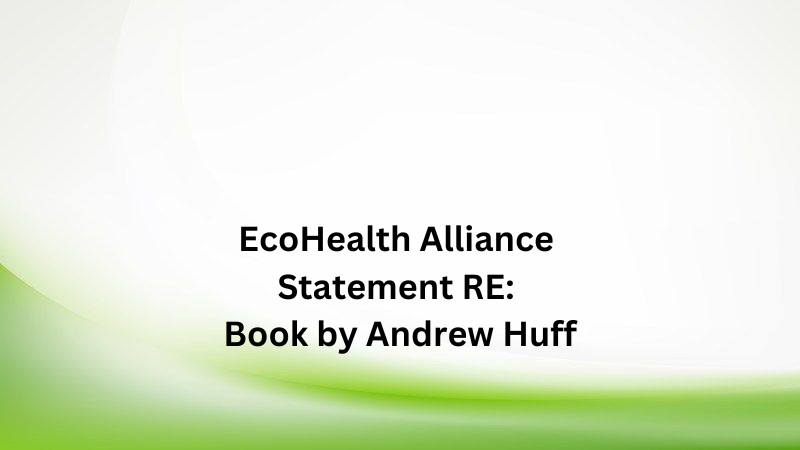
 ecohealthalliance.org
ecohealthalliance.org
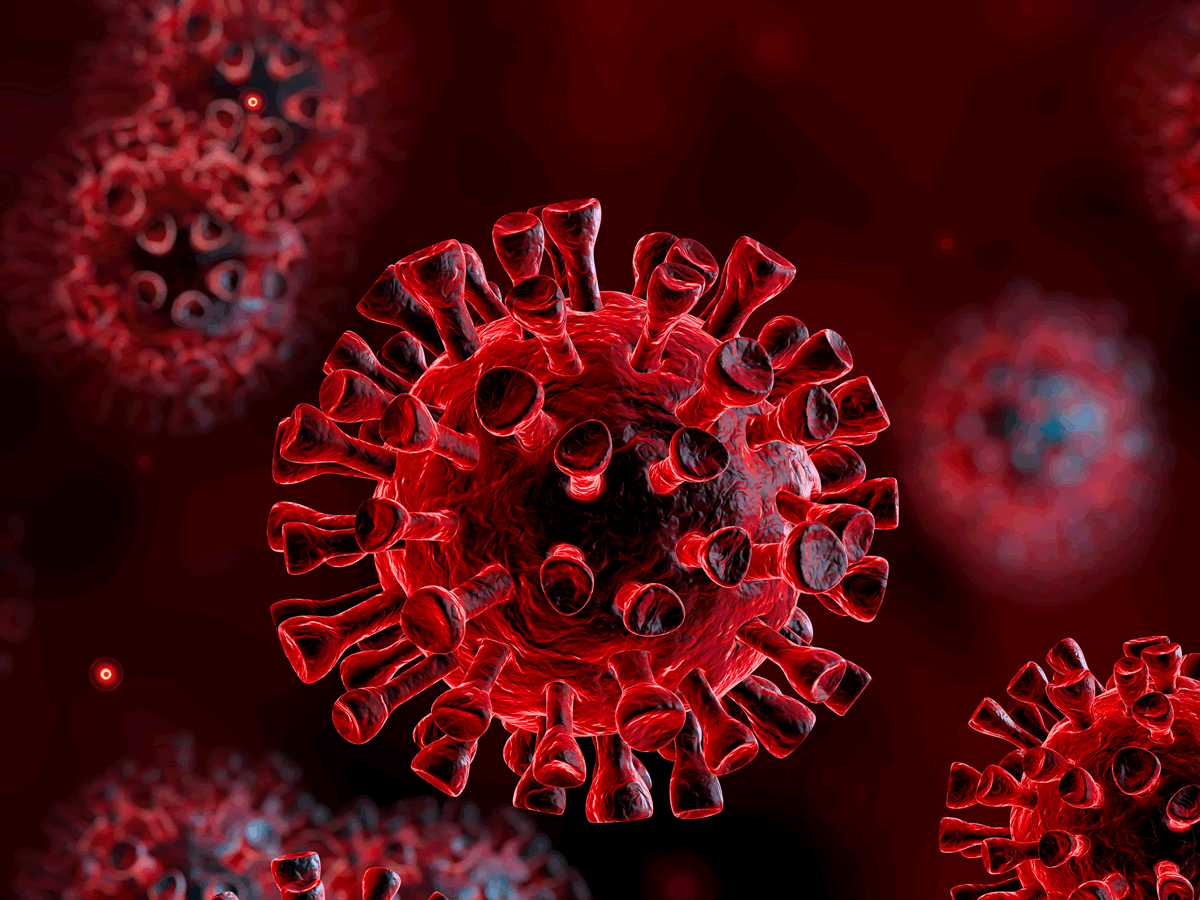
 torontosun.com
torontosun.com
Author of the article:Kevin Connor
Publishing date
COVID is a man-made virus, a scientist who worked at the Wuhan Institute of Virology in China says.
Scientist Andrew Huff, who worked at the Wuhan Institute of Virology, blamed authorities for the “biggest U.S. intelligence failure since 9/11,” Britain’s the Sun is reporting.
The lab has been involved in debates about the origins of COVID.
Huff, an epidemiologist, said in his recent book, The Truth About Wuhan, that the pandemic was the result of the U.S. government’s funding of coronaviruses in China.
He said China’s gain-of-function experiments were carried out with lax security.
“Foreign laboratories did not have the adequate control measures in place for ensuring proper biosafety, biosecurity, and risk management, ultimately resulting in the lab leak at the Wuhan Institute of Virology,” Huff said in his book.
There are experts who believe that the virus could have escaped through an infected scientist or the improper disposal of waste at the lab.
Huff is a former vice-president of EcoHealth Alliance, a New York-based nonprofit that studies infectious diseases.
The group has been studying different coronaviruses in bats for more than a decade.
Huff, who worked at EcoHealth Alliance, said the nonprofit helped the Wuhan lab put together the “best existing methods to engineer bat coronaviruses to attack other species” for many years.
“Foreign laboratories did not have the adequate control measures in place for ensuring proper biosafety, biosecurity, and risk management,” Huff wrote in his book.
“China knew from day one that this was a genetically engineered agent. The U.S. government is to blame for the transfer of dangerous biotechnology to the Chinese. I was terrified by what I saw. We were just handing them bioweapon technology.”
EcoHealth Alliance issued a statement regarding Huff’s book, saying “The actual “truth about Wuhan” is:
“1) Mr. Huff was employed by the EcoHealth Alliance from 2014 to 2016. However, reports that he worked at or with the Wuhan Institute of Virology during that time are untrue. He was assigned to a completely different project working on computer-based algorithms to assess emerging disease threats.
2) Mr. Huff alleges that EcoHealth Alliance was engaged in gain of function research to create SARS-CoV-2. This is not true.
3) Mr. Huff makes a number of other speculations and allegations about the nature of the collaboration between EcoHealth Alliance and the Wuhan Institute of Virology. Given that he never worked at or with the Wuhan Institute of Virology, his assertions along these lines cannot be trusted.
4) Mr. Huff claims that SARS-CoV-2 emerged as a lab leak from the Wuhan Institute of Virology based on research conducted there on bat coronaviruses and, further, that this research was related to U.S. intelligence gathering efforts. This is not true.”

EcoHealth Alliance Statement Regarding Book by Andrew Huff - EcoHealth Alliance
EcoHealth Alliance Statement Regarding Publication of Andrew Huff’s "The Truth About Wuhan" Book.

COVID man-made, former Wuhan-based scientist says
COVID is a man-made virus, a scientist who worked at the Wuhan Institute of Virology in China says.
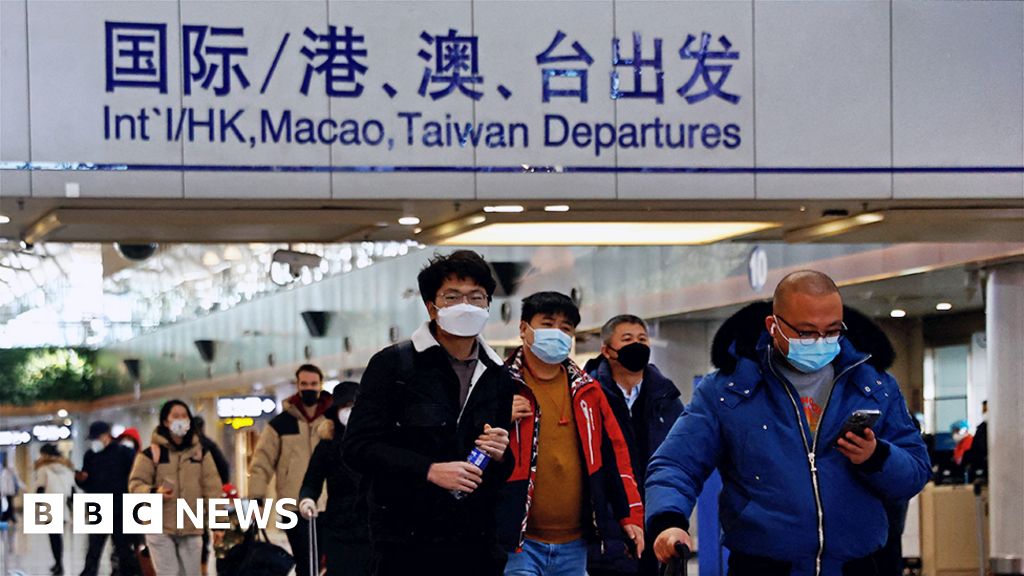
Covid in China: US imposes Covid testing for visitors from China
Several other countries have imposed restrictions on travellers from China as Covid cases surge.

This is all feeling like déjà vu…but Trudeau isn’t over in Africa trying to buy a UN Security Seat this time…
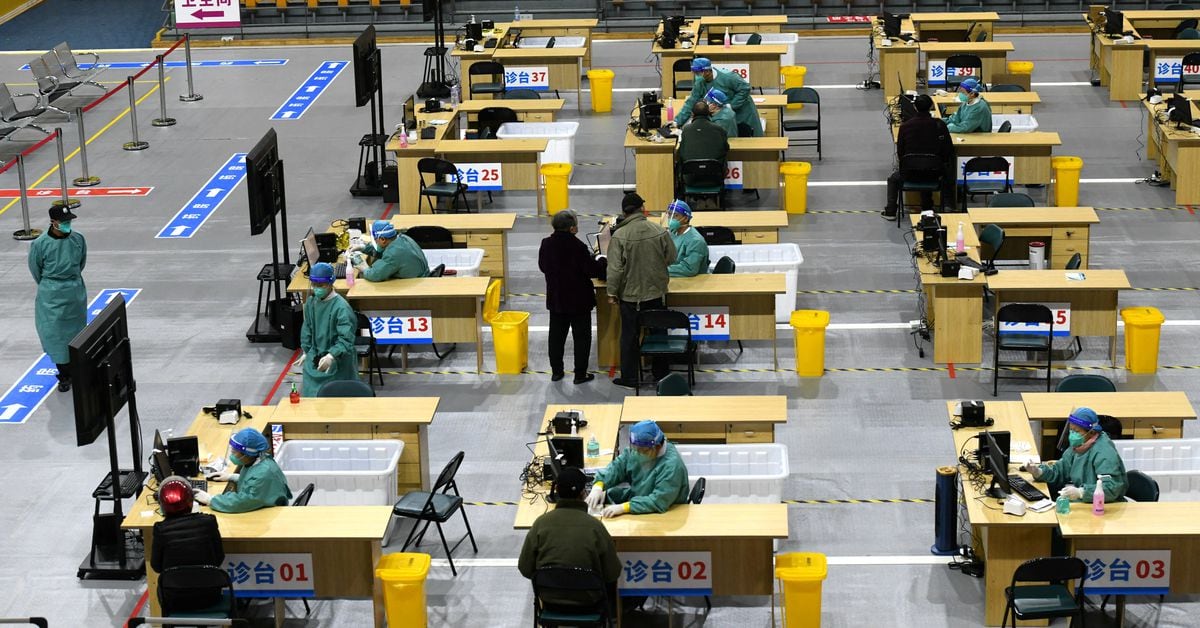
COVID pressures China's hospitals as countries mandate tests for travelers
Chinese hospitals and funeral homes were under intense pressure on Wednesday as a surging COVID-19 wave drained resources, while the scale of the outbreak and doubts over official data prompted some countries to enact new travel rules on Chinese visitors.

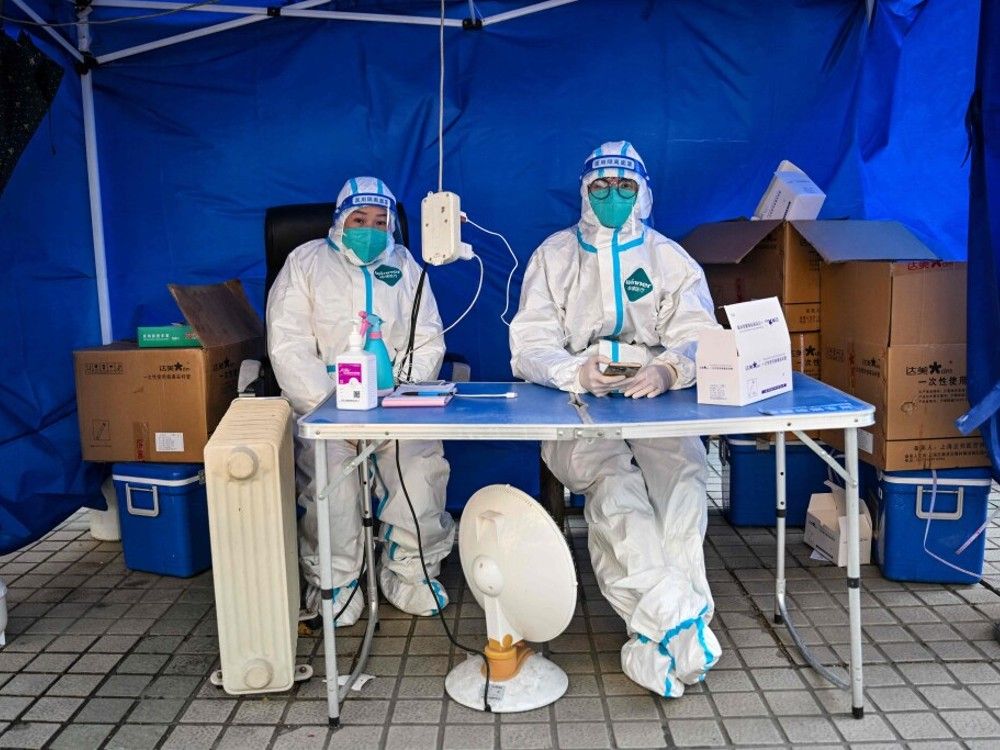
Health Canada monitoring massive COVID outbreak 'starting to rip through' China
More than 5,000 people are probably dying each day from COVID-19 in China, health data firm Airfinity estimated
Dr. Isaac Bogoch, an infectious disease physician at Toronto’s University Health Network, said ending the zero-COVID policy, especially in a population with lower vaccine rates, will mean a wave of new infections.
More than 5,000 people are probably dying each day from COVID-19 in China, health data firm Airfinity estimated, offering a dramatic contrast to official data from Beijing on the country’s current outbreak.
Its estimates were “in stark contrast to the official data, which is reporting 1,800 cases and only seven official deaths over the past week,” it said in a statement.
One variant circulating in China is BF.7, an Omicron variant that is also present in Canada. Maddison said the government is continuing to follow it, but it has not become dominant in Canada.
The emerging outbreak in China is also putting pressure on drug supplies in the country, prompting China to order more supplies from around the world. Maddison said Health Canada will work with industry if any shortages emerge (???).
“Health Canada is closely monitoring the situation in China and the potential impact it may have on the global supply chain and the supply of drugs in Canada,” she said. “When potential or actual supply disruptions occur, Health Canada works in collaboration with global regulatory partners, provinces and territories, healthcare professionals, and industry stakeholders to share information and monitor the situation.”
Hmmm…. I wonder if anybody from ‘Health Canada’ has tried to buy children’s Tylenol in Canada since the early fall of 2022?
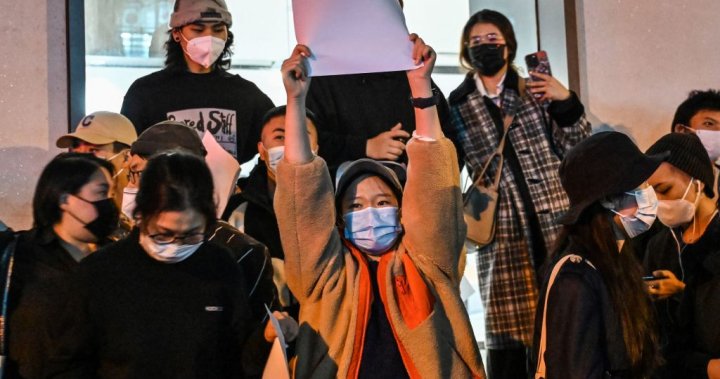
Chinese immigration to Canada hits new peak as some flee zero-COVID restrictions - National | Globalnews.ca
Immigration from China has bounced back from pandemic lulls to hit a new peak, according to Canadian government statistics.

Canada stands with people ‘expressing themselves’ amid China COVID-19 protests: Trudeau - National | Globalnews.ca
'Obviously, everyone in China should be allowed to express themselves, should be allowed to share their perspectives and indeed, protest,' Trudeau said.
China’s sudden shift from Covid-zero raises more questions than answers — South China Morning Post
“It all happened suddenly,” said Wang Guohong, his voice still hoarse from Covid-19. Within days, the 46-year-old Beijing resident had gone from relief at seeing China’s stringent pandemic controls dismantled to helplessness, with his entire family…
In Qingdao, in the eastern province of Shandong, between 490,000 and 530,000 people – from a population of 10 million – are becoming infected each day, Bo Tao, the head of the city’s health commission, said on Friday.
At manufacturing hub Dongguan, in southern China’s Guangdong province, new daily infections are estimated at 250,000 to 300,000 people. In the eastern province of Zhejiang, health authorities estimate the daily number at over 1 million and project it to surge to 2 million around New Year’s Day.
Using regional Chinese data, British-based health data firm Airfinity has calculated that more than 5,000 people are probably dying each day from Covid-19 in China, an estimate “in stark contrast to the official data which is reporting 1,800 cases and only seven official deaths over the past week,” it said last Thursday.
Only Covid-19 patients who die from pneumonia or respiratory failure are counted in the official death toll, a narrow definition which limits the number of deaths being reported as the virus surges.
The sight of Beijing caught off guard by an infection surge – polls on social media platforms suggest roughly 80 per cent of the capital’s 21 million residents were infected over the past few weeks – has many local governments scrambling.
It remains unclear how many people have been infected with the virus in China since the central government stopped reporting daily case numbers last weekend.
According to the memo purportedly from an NHC meeting – which was circulated online and cannot be independently verified – about 248 million people around the country were infected from December 1 to 20, accounting for 17.56 per cent of the population.
It said about half the population in both Beijing and Sichuan province had tested positive.
Beijing’s Covid surge has passed the peak, foreign ministry says — South China Morning Post
The coronavirus surge in Beijing has peaked – the first Chinese city to reach this point since the country abandoned its zero-Covid policy, according to the foreign ministry. It comes after a leaked document purportedly from a National Health Commission…
China's official COVID case count has become meaningless after it rolled back mass testing and allowed residents to use antigen tests and isolate at home. It has stopped reporting asymptomatic cases, conceding it was no longer possible to track the actual number of infections.
According to an internal estimate from the National Health Commission, almost 250 million people in China have caught Covid in the first 20 days of December -- accounting for roughly 18 per cent of the country's population.
Experts have warned that as people in big cities return to their hometowns for the Lunar New Year next month, the virus could sweep through China's vast rural areas, where vaccination rates are lower and medical resources are severely lacking.
Beijing to distribute Pfizer antiviral drug as COVID-19 wave strains health system — CTV News
Beijing will begin distributing Pfizer's COVID-19 drug Paxlovid to the city's community health centers in the coming days, state media reported Monday.

Trudeau criticized for supporting China protest after Canada COVID unrest
The prime minister invoked Canada's Emergencies Act in February in response to the Freedom Convoy trucker protests.
Winning praise in Beijing’s vast propaganda machinery, the Trudeau government waited until 80 other countries had severely restricted flights originating in China before foreign arrivals at Canada’s airports were finally shut down, almost entirely, on March 16, 2020.
That’s the prologue. Here’s where we’re at now.
Beijing to distribute Pfizer antiviral drug as COVID-19 wave strains health system — CTV News
Beijing will begin distributing Pfizer's COVID-19 drug Paxlovid to the city's community health centers in the coming days, state media reported Monday.
During the first three weeks of this month, China’s National Health Commission had publicly reported 62,592 new symptomatic Covid cases. According to Bloomberg News and the Financial Times, a deputy director of China’s Centre for Disease Control and Prevention disclosed in an internal health briefing on Dec. 23 that the true number was closer to 250 million new infections during those same three weeks. Some epidemiologists say between 1.3 million and 2.1 million Chinese people will likely die from the virus in the coming weeks and months.
On Boxing Day, Beijing announced that it was dropping COVID-related restrictions at China’s airports and would start issuing passports again on Jan. 8 to all Chinese citizens wishing to travel abroad.
It’s not like all Chinese citizens have been prevented from leaving the country — nearly 10,000 Chinese citizens obtained permanent-resident status in Canada during the third quarter of this year. But now, Japan and the United States are already scrambling to figure out whether to revisit their COVID-related restrictions on international travel, owing to the Chinese disaster.
No word out of Ottawa yet, beyond Health Canada’s assurance that it’s monitoring the situation.
Or that, if this is bad as it sounds, by spreading it globally, they remain on a more level footing financially by infecting everybody else so that they are not falling behind everyone else.The obvious reason china is opening it's borders up is that they're hoping it spreads again so they don't look so bad for having so many cases. Duh
Science is always what it is. Anybody who tries to corrupt or misuse the term isn't doing science, they're doing politics.
The answer's no different today than it was when Galileo said it 400 years back. . . "Yet it moves."
If scientists get funding based on the outcome of the research in One Direction but not in another….is it still science with a predetermined outcome? Yes it’s science but it’s not exactly unbiassed. If the winds of politics and Wokeness determined in advance who gets funding and who doesn’t with respect to science…. it would definitely influence The direction of research….in a publish or perish world of science.
A recent example of the pivot from science to social justice comes from the journal Nature and its sister publications. Last month, it announced changes to its ethics guidelines that allow censorship of research deemed politically incorrect.
Ethics guidelines traditionally protect individual study subjects from being harmed in the course of scientific research, but Nature’s editors hope to extend this protection to address “potential harms for human population groups who do not participate in research but may be harmed by its publication.”
The journal even called on researchers to “respect the rights of non-human life, tangible and intangible heritage, natural resources and the environment.” The implication here is that science should be informed not only by evidence, but social movements and cultural history, as well.
Researchers looking to publish in the top journal will have to “carefully consider” the impact of their work on various groups of people. Authors must use “inclusive, respectful, non-stigmatizing language” in their work. They’re advised to follow the bias-free language guide of the American Psychological Association (which declared that “traditional masculinity” was harmful to men back in 2019).
This is a problem.
OK, I admit I was unaware any serious (or even frivolous) scientist was researching One Direction. Boybandology is a new field for me.
And the answer is "no." Any new knowledge gained is valid regardless of what other new knowledge is not gained (yet).
It is a slippery slope, & once that can of worms is opened where does it stop? Once blatant influence (you don’t get funding if you’re researching in this direction, and even if you manage it you don’t get published because Wokeness and politics) intrudes….try to prove where it does and doesn’t happen. On that note I understand Dixie Cup’s position though I don’t agree with it.
This will influence opinion & trust in the outcome of “science” & research results and we have been seeing this for quite some time now.
Scientists advance human knowledge by publishing their work in research journals like Nature. It’s one thing refuse to publish research that is racist and unscientific (like phrenology and Holocaust denial), or use demeaning language in their articles, though it’s hard to imagine that such things would be published in a prestigious journal like Nature, even in the absence of the new guidelines.
Nature, however, is going a step further by creating a set of broad, and overly vague, guidelines that threaten to hinder legitimate research, especially surrounding topics that may be uncomfortable, but are nevertheless beneficial to society. This can be anything from COVID Guidelines to the whole Global AGW Warming/Cooling/Changing thing and many things in between.
Was it "wokeness" that funded the atomic-bomb research, or the decision to go for the fission bomb instead of the fusion bomb?
Away with your whining. The Catholic Church tried to stop Tycho Brahe and Galileo. The proponents of phrenology and racism produced reams of shit purporting to be science. How'd that go?
But i thought you said the science always is what it is? And that you'd never heard of boybandology?
Ron is quite right. Science, is a method. The method can be seriously corrupted by accidental or intentional bias very easily. Some people believe science is some sort of 'pure' method of distilling facts but that simply isn't the case. How the question is framed, how the results are interpreted, and how the information is published (or not) radically affects the out come, and those are all human inputs. And humans are bias.
Penicillin works. Anesthesias have saved millions from pain. The second law of thermodynamics has no reference to race or creed. The scientific method is the very closest attempt in all of history to remove all prejudice, of any kind, from the attempt to answer any question. Its kernel, its very ultimate idea, is submission to what is really seen, what is really there, what is really to be understood.Whenever you condemn one "side" and not the other that does the same thing, you're whining.
As I've pointed out, forces left, right, and center; political, religious, and business; have always tried to control science and suppress its findings.
Science don't care. Neither does engineering (applied science). I have absolutely no fucking doubt when Ogg worked out that fire-hardening his sharp stick gave it better penetration and less vulnerability to splitting, the medicine man said "The spirits demand that sharp sticks be pure, not burnt!" and some fuckwit started babbling that the fire HURT the sticks!
So Ogg and his family ate better, with less effort, than anybody else in the band. And a few years later all the hunters were fire-hardening their sharp sticks and the medicine man and the stick-lovers found something else to bitch about. Cuz they like to eat, too.
And so it has gone ever since.
Most important of all, the colour of the skin of a discoverer has no bearing on the discovery.
You cannot “decolonize” science, because science has no colonies, it wishes none, and would lose all verity if it owed any allegiance except to cold observation, relentless questioning, and the utter exclusion of secondary impulses, most particularly those of race and activism.

Rex Murphy: Science does not need to be 'decolonized'
Does Concordia University wish to be an instrument of learning, or a funnel for wokeness?
How would a person decolonize penicillin? Or anesthesia? Or open-heart surgery? Or the miracle advances the past century gave the world through the understandings — still not complete — of quantum physics?
Scientific truth is the truth of bare fact. The only reverence science knows is the genuflection before hard, physical reality. Science wears no ribbons of fealty to causes, colours or the predispositions of any mentality or ideology, other than the asking of questions and the submission to the answers provided by absolutely neutral inquiry — answers always tentative, always open to revision or correction; science is never final….Unless it is a politician. Like Justin Trudeau, or Al Gore talking about science…settled science, etc…